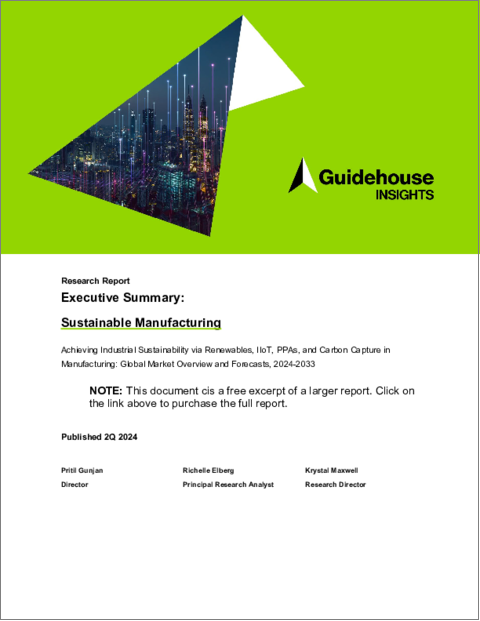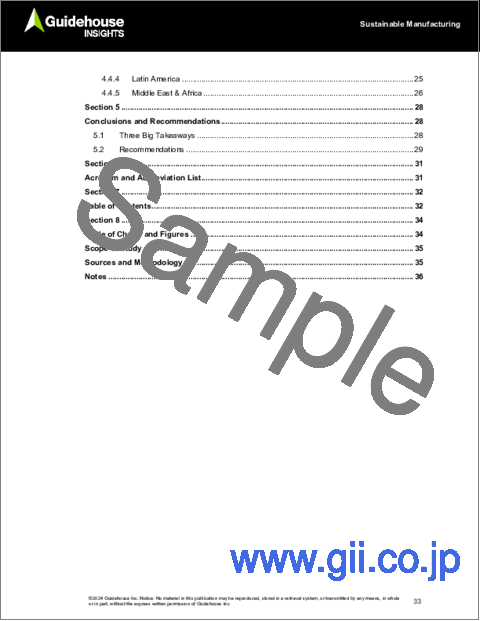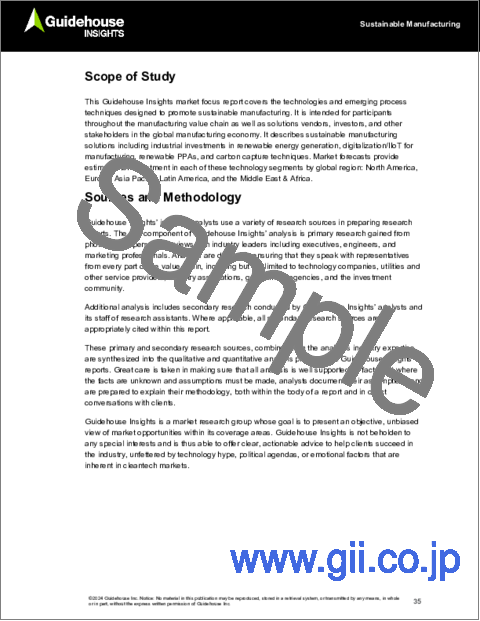|
|
市場調査レポート
商品コード
1462794
持続可能な製造業 - 製造業での再生可能エネルギー・IIoT・PPA・炭素回収による、産業界における持続可能性の実現:世界市場の概要と予測 (2024~2033年)Sustainable Manufacturing - Achieving Industrial Sustainability via Renewables, IIoT, PPAs, and Carbon Capture in Manufacturing: Global Market Overview and Forecasts, 2024-2033 |
||||||
|
|||||||
| 持続可能な製造業 - 製造業での再生可能エネルギー・IIoT・PPA・炭素回収による、産業界における持続可能性の実現:世界市場の概要と予測 (2024~2033年) |
|
出版日: 2024年04月12日
発行: Guidehouse Research
ページ情報: 英文 37 Pages; 21 Tables, Charts & Figures
納期: 即納可能
|
全表示
- 概要
- 図表
- 目次
気候変動が加速し、世界各国の政府が温室効果ガス (GHG) 排出量の削減に真剣に取り組むようになるにつれ、製造業者は、年次報告書に記載された難解な持続可能性目標ではもはや十分ではないことに気づきつつあります。概念的には、持続可能な製造業は複雑ではありません。より効率的なプロセスによるエネルギー使用量の削減、従来のエネルギー源を自然エネルギーに置き換えることによるGHG排出量の最小化、デジタル化とリーン生産プロセスによる稼働時間と生産効率の改善、そして、万策尽きた場合には、排出された炭素を隔離または再利用するための炭素回収技術の導入、などが挙げられます。
こうした技術や手法は現在も存在しますが、産業界が真に持続可能な製造業を実現するにはまだほど遠いです。20世紀的な施設の更新に伴うコストと複雑さは、製造業における持続可能性ソリューションの広範な展開にとって依然として大きな障壁となっていますが、政府による義務付けやエンドユーザー側の需要により、製造業の各業界の経営幹部は今後の状況悪化の兆しを認識するようになってきています。
当レポートでは、持続可能な製造業に向けた主な動きについて分析し、産業プロセスをより持続可能なものにする中核となる4つの主要技術分野 (デジタル化と産業用IoT (IIoT) 技術、構内設備による再生可能エネルギー容量の増加、電力購入契約 (PPA) による再生可能エネルギー容量の増加、炭素回収・利用・隔離技術) への投資予測を掲載しています。当レポートでは、循環型経済とリサイクル手法の概要を提供し、リーン生産方式の数々について説明しています。最後に、世界の持続可能な製造技術の中核分野への投資動向 (2024~2033年) を地域別・技術別に予測しています。
目次
第1章 エグゼクティブサマリー
第2章 市場の問題
- 持続可能な製造業
- 持続可能な製造業のビジネスケース
- デジタル化/IIoT
- 再生可能エネルギー
- 電力購入契約
- 炭素回収
- その他の新規技術と持続可能なプロセス
- 持続可能な製造市場促進要因と障壁
第3章 業界のバリューチェーン
- 製造業のバリューチェーン
- 持続可能な製造業のステークホルダーと競合情勢
第4章 市場予測
- 持続可能な製造技術ソリューション市場の展望
- 予測手法
- 世界市場の概要
- 地域別の市場概要
- 北米
- 欧州
- アジア太平洋
- ラテンアメリカ
- 中東・アフリカ
第5章 結論・提言
- 3つの大きなポイント
- 推奨事項
第6章 頭字語と略語一覧
第7章 目次
第8章 図表
第9章 調査範囲
第10章 情報源、調査手法、注釈
List of Tables
Tracked Renewable PPA Capacity, All Corporate vs. Manufacturing/Industrial, World Markets: Dec 2008-Feb 2023
- Annual Investment in Sustainable Manufacturing Technologies by Region, World Markets: 2024-2033
- Annual Investment in Sustainable Manufacturing Technologies by Technology, World Markets: 2024-2033
- Annual Investment in Sustainable Manufacturing Technologies by Technology, North America: 2024-2033
- Annual Investment in Sustainable Manufacturing Technologies by Technology, Europe: 2024-2033
- Annual Investment in Sustainable Manufacturing Technologies by Technology, Asia Pacific: 2024-2033
- Annual Investment in Sustainable Manufacturing Technologies by Technology, Latin America: 2024-2033
- Annual Investment in Sustainable Manufacturing Technologies by Technology, Middle East & Africa: 2024-2033
Environmental Benefits of Lean Manufacturing Methods
List of Figures
- Annual Industrial Renewables Capacity Additions by Region, World Markets: 2024-2033
Annual Investment in Sustainable Manufacturing Technologies by Region, World Markets: 2024-2033"
Annual Investment in Sustainable Manufacturing Technologies by Technology, World Markets: 2024-2033"
Percentage of Sustainable Manufacturing Investment by Region, World Markets: 2024
Percentage of Sustainable Manufacturing Investment by Region, World Markets: 2033
Annual Investment in Sustainable Manufacturing Technologies by Technology, North America: 2024-2033"
Annual Investment in Sustainable Manufacturing Technologies by Technology, Europe: 2024-2033"
Annual Investment in Sustainable Manufacturing Technologies by Technology, Asia Pacific: 2024-2033"
Annual Investment in Sustainable Manufacturing Technologies by Technology, Latin America: 2024-2033"
Annual Investment in Sustainable Manufacturing Technologies by Technology, Middle East & Africa: 2024-2033"
Manufacturing Value Chain: Multiple Opportunities for Efficiency and Sustainability
Examples of Stakeholders in the Manufacturing Value Chain
As climate change accelerates and governments around the world grow more serious about reducing greenhouse gas (GHG) emissions, manufacturers are realizing that esoteric sustainability goals in annual reports will no longer suffice. Conceptually, sustainable manufacturing is not complicated. Manufacturers can make their factories greener in numerous ways: reducing energy use through more efficient processes; minimizing GHG emissions by replacing traditional energy sources with renewables; improving uptime and production efficiency via digitalization and lean manufacturing processes; and, when all else fails, implementing carbon capture techniques to sequester or repurpose carbon emissions.
All these technologies and methodologies exist today-but the industrial world remains far from achieving truly sustainable manufacturing. The costs and complexity involved in upgrading 20th century facilities remain significant barriers to broader deployment of sustainability solutions in manufacturing, but increasingly, government mandates and end-user demand are driving executives in manufacturing verticals to acknowledge the writing on the wall.
This Guidehouse Insights report analyzes major trends in sustainable manufacturing and forecasts projected investment in four key technology areas that will be core to rendering industrial processes more sustainable: digitalization and industrial IoT (IIoT) technologies; increased renewables capacity through on-premises facilities; increased renewables capacity via power purchase agreements (PPAs); and carbon capture, utilization, and sequestration techniques. The report provides an overview of circular economy and recycling methodologies and describes numerous lean manufacturing principles. Finally, it projects global investments in core sustainable manufacturing technology segments by region and technology from 2024 through 2033.
Table of Contents
1. Executive Summary
1.1 Global Investment in Sustainable Manufacturing
2. Market Issues
- 2.1 Sustainable Manufacturing
- 2.1.1 The Business Case for Sustainable Manufacturing
- 2.1.2 Digitalization/IIoT
- 2.1.3 Renewable Energy
- 2.1.3.1 Emerging Renewables
- 2.1.4 Power Purchase Agreements
- 2.1.5 Carbon Capture
- 2.1.6 Other Emerging Technologies and Sustainable Processes
- 2.1.6.1 Circular Economy/Recycling
- 2.1.6.2 Zero Energy Buildings
- 2.1.6.3 Lean Manufacturing
- 2.2 Sustainable Manufacturing Market Drivers and Barriers
3. Industry Value Chain
- 3.1 The Manufacturing Value Chain
- 3.2 Sustainable Manufacturing Stakeholders and Competitive Landscape
4. Market Forecasts
- 4.1 Market Outlook for Sustainable Manufacturing Technology Solutions
- 4.2 Forecast Methodology
- 4.3 Global Market Overview
- 4.4 Regional Market Overview
- 4.4.1 North America
- 4.4.2 Europe
- 4.4.3 Asia Pacific
- 4.4.4 Latin America
- 4.4.5 Middle East & Africa
5. Conclusions and Recommendations
- 5.1 Three Big Takeaways
- 5.2 Recommendations






